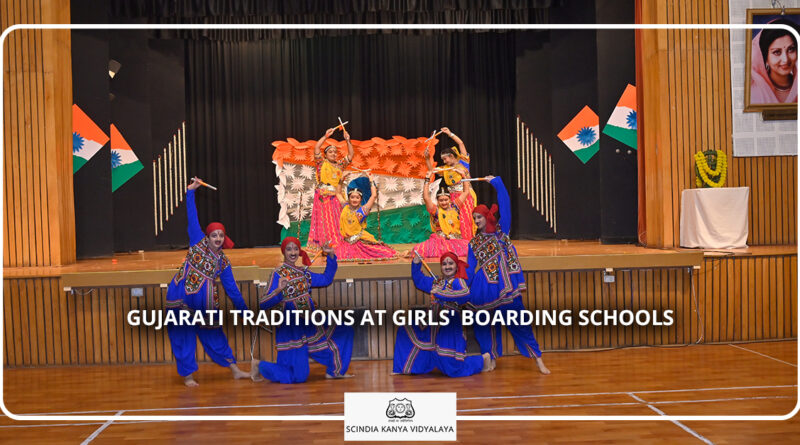Cultural Immersion: Gujarati Traditions at Girls’ Boarding Schools
Students studying in the best boarding schools in India are exposed to cultural immersion due to the diverse backgrounds of students at school. While living together, it is evident that students will become curious about other cultures and traditions and imbibe what they find unique and intriguing. SKV is a female boarding school in Madhya Pradesh that educates students from all over India, especially Gujarat. The culture and traditions of Gujarat are pretty popular and visible in SKV as we celebrate various Gujarati festivals, organise competitions to root the culture and heritage of Gujarat, and offer cultural exchange programmes to have natives of Gujarat interact with our students. It is a way of tradition preservation in girls’ schools. Let us learn more about cultural immersion and Gujarati traditions at SKV.
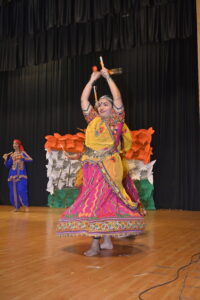
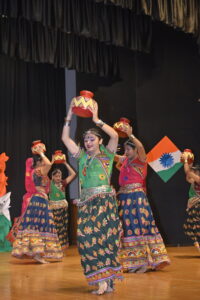
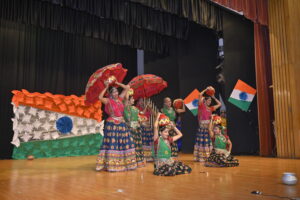
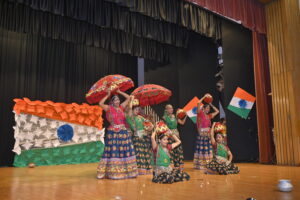
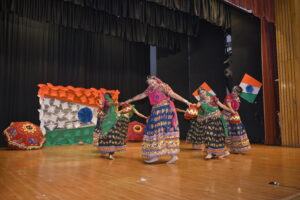
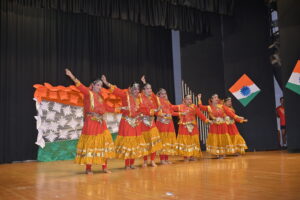
What do you mean by cultural immersion?
India is a land of cultural diversity, and people living here are often a blend of more than one culture. Cultural immersion is integrating and imbibing a culture different from yours by interacting with diverse communities and learning new cultures and traditions. By profoundly engaging and experiencing a variety of customs, traditions, values, and languages, learners can develop a keen interest and zeal for adapting to new cultures and their way of life. Rather than being distant observers of cultures, individuals engage by immersing themselves in the local environment and actively becoming part of the cultural experience. There are multiple reasons for cultural immersion, including travel to different destinations, study abroad programs, living in a foreign country, and interacting with people from different cultural backgrounds in one’s community. The goal is to experience, deeply immerse in, and truly live the culture. Boarding schools are primary locations for cultural immersion in the early stages of life.
What are the cultural traditions of Gujarat?
When referring to Gujarati traditions and culture, much of its roots can be traced back to the mythology of Lord Krishna. A part of the ancient Indus Valley civilisation, Gujarat is the birthplace of Lord Shiva and a vibrant mix of many religions, including Jainism, Buddhism, Hinduism and Islamism. The amalgamation of various religions represents the level of cultural tolerance, unity and mutual love in Gujarat. The place has a rich cultural heritage, with over six sites honoured by UNESCO for world heritage. The tradition of Gujarat includes-
- Gujarati language and literature– The indigenous language used in Gujarat is Gujarati, with about 11 dialects spoken across the state. Being a site for cultural heritage, the land also inculcates speakers of other languages such as Hindi, Sindi, Urdu, Kutchi and Marathi. Regarding literature, poetry and prose are widely studied by the natives. Famous Gujarati writers like Narsinh Mehta, Pannalal Pate, and Suresh Dalal have established themselves and have a wide following of readers in Gujarat.
- Traditional Attire– Gujarati attire is a mark of sheer elegance and beauty. Women are seen dressed in chaniya choli and bandhani sarees. Local men are dressed in kurta and dhoti, also known as ‘chrono’, following the age-old dressing sense of the state. On top of this, people also wear Angarakhu. The vibrant combination of colours, patterns and designs adds to the charm of clothes.
- Cuisine– Gujarati cuisine recipes are more diverted towards a sweet and salty palette than spicy food. It is primarily a vegetarian state, but due to its closeness to the seas, it also circulates seafood. Gujaratis consume Dal-bhaat-rotli-saak on average throughout the year. Other popular dishes are khandvi, undhiyu, khakhra, ganthiya, and khaman. They have basundi, aam ras, shrikhand and much more for deserts.
- Festivals and celebrations– Holi and Diwali are widely celebrated throughout India, and Gujaratis actively celebrate them. But Gujarat is immensely known for its loud and grand celebration of Uttrayan and Navratri. Gujarati folk songs and garba raas can be witnessed by the tourists and colloquials. Gujarati cultural festivals are full of pomp and light and emit immense amounts of energy through the active participation of people.
- Gujarati Handicrafts– The state is known for its embroidery, beadwork, and pottery that focuses on tribal art. ‘Patola’ saree is the art of producing ikat woven sarees that can be seen in the markets of Gujarat. Intricate embroidery using mirror work can be seen on Bandhej products, including turbans, chunni, and handbags. Khavda pottery is the traditional way of moulding clay into bowls, pots and vases.
What is the role of culture in Gujarati families?
Culture in Gujarati families plays an essential role in shaping their values, traditions, and way of living and is quite central and influential in their families. Gujaratis strongly emphasise family, community building, and imparting traditional values from generation to generation.
- Imparts family values– Gujarati culture is the foundation for family values, and they usually live in closely-knit joint families. The family is not limited to its core members but also involves relatives. Elders are respected and looked up to in every decision and activity in the house.
- Spirituality– Gujaratis actively participate in every festival and gathering to pay references to various Gods. A sense of spirituality and shared identity exists as people from different religions and cultures come together to respect all cultures. Daily prayers and deity worship are common.
- Community building– People living in Gujarat develop a sense of brotherhood and are devoted towards community services and charitable events where they can give back to society.
- Education and professionalism– Gujaratis are well-educated, so they prioritise and highly value child education to ensure a better future for their wards. They have remarkable excellence in business, entrepreneurship, medicine, and law, among various other fields.
Importance of cultural events in students’ overall development
Cultural events play a significant role in a student’s overall development by exercising the various mental and physical facilities.
- Enhances creativity– By actively participating and attending cultural events, the brain’s creative centre gets exercised. Boarding schools offer righteous exposure to different forms of art and expression and can inspire students to think creatively by exploring new ideas and developing their artistic talents.
- Improves communication skills– Students involved in cultural events must communicate effectively with other participants and mentors. It helps prevent social anxiety, helps students learn to respect diverse opinions, and improves teamwork. Students develop their communication and public speaking skills when performing on stage or discussing artistic interpretations.
- Develops cultural identity– The top boarding schools in India believe cultural events can strengthen students’ connection to their cultural heritage and identity. It helps give a deeper understanding of diverse cultures and instils pride and belonging.
- Promotes cultural exchange– Students residing in residential schools live with peers, staff, and mentors from different cultures and experiences. Cultural events often bring people from different backgrounds together, fostering cultural exchange and cross-cultural understanding among students. It, therefore, also promotes global citizenship.
How are Gujarati traditions integrated into SKV girls’ boarding schools?
Students of SKV have undergone cultural immersion at school by learning and imbibing about various Gujarati cultures and traditions.
- Celebrating festivals– SKV offers an energetic and lively environment by giving students a break from academics and shifting them to a relaxing mood. Gujarati festivals of Navratri Uttrayan are a delight. They are celebrated with full enthusiasm and passion at SKV, where students actively lead various events and participate in uplifting the mood of festivity.
- Cultural exchange programmes– To expose students to Gujarati ethnicity and culture, SKV organises cultural exchange programmes where students meet other students from boarding schools in Gujarat or get invited to participate in various competitions or fests. It fosters social interaction and cultural tolerance, where students develop cultural respect for Gujarati traditions and culture.
- Cultural competitions– SKV hosts a series of competitions in light of various Gujarati festivals where students participate in inter-house Gujarati folk dance competitions: Tippani dance, Gagar (Beda/Pot) dance, Garbi and Dandia Raas. These competitions are a part of extracurricular activities in girls’ schools and are organised yearly to educate students about the traditional Gujarati customs.
- Guest lectures– SKV takes a step ahead by inviting esteemed guests from various schools in Gujarat to talk to students, share their experiences, and resolve student queries. It is incredibly beneficial in understanding Gujarati culture from a native of the state.
The cultural immersion of Gujarati traditions in students of SKV is quite visible as students are coming forward to learn more about the culture.
How is SKV celebrating the Gujarat cultural event?
SKV offers an open stage for students to explore their talents and, in parallel, learn about Gujarati tradition and culture. For this, Scindia Kanya Vidyalaya recently organised an inter-house folk dance competition, among several other activities, to celebrate the richness of Gujarati heritage. Students were allowed to showcase their patriotism and respect for their nation and Gujarati culture through different folk dances of Gujarat. Various dance forms were showcased, such as Tippani dance, Gagar (Beda/Pot) dance, Garbi and Dandia Raas. Students enjoyed themselves and, at the same time, learnt about the excellence that lies within Gujarati folk forms.

